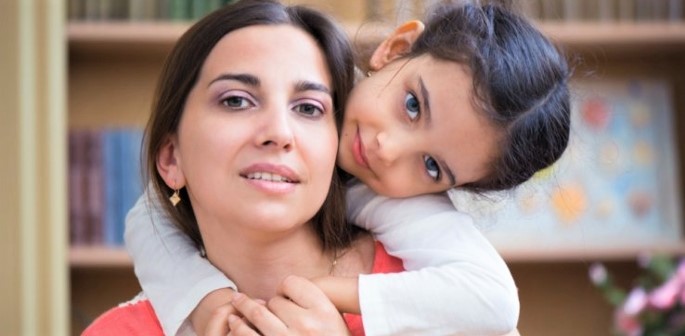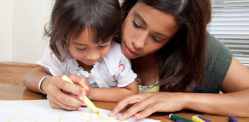"At least we could breathe when we just lived with one parent."
In Britain, the number of children raised by single parents is substantial, as it is worldwide. Thus British Desi single-parent families are becoming more common in 2021.
The UK Charity Gingerbread supports single parents and highlights that there are approximately 1.8 million single parents.
In addition to this, there is a sharp gender dynamic in single-parent households. Approximately 90% of British single parents are women.
Yet despite the prevalence of single-parent families, they continue to be sidelined in government policy. Such Desi families also face ongoing socio-cultural stigma.
There have been assertions that children from single-parent families are more likely to be delinquent, have emotional struggles, face poverty and educational failure.
Consecutive British governments have made policies, that in one way or another, disproportionately and negatively impact single-parent families, such as welfare reforms.
Moreover, Boris Johnson in his role as a journalist in a 1995 issue of The Spectator wrote children of single mothers are:
“Ill-raised, ignorant, aggressive and illegitimate.”
In the same column, he said it was “outrageous” that married couples should fund “the single mothers’ desire to procreate independently of men.”
The revelation of Johnson’s article in 2019 led to significant backlash. Whilst he asserted the piece was written before he got into politics, it still matters.
Public officials/figures can play a powerful role in maintaining and creating damaging images of single-parent families.
Ruby Begum*, a 24-year-old Bangladeshi undergraduate student in Birmingham saw her parents divorced in 2010.
Ruby feels that narratives in Britain and governmental stances can negatively portray single-parent families:
“When my parents first split, I started to become self-conscious of what I was hearing. Like in the news, when the politicians talked.
“I remember the little digs they would take at dangers of being from a family of a single parent. Especially the Conservatives.
“They were wrong. Sure there can be rubbish experiences but ain’t that with any family? They kind of brush all single-parent families as not so great.”
Those raised by single parents like Ruby can become acutely aware of undertones in narratives and discussions encompassing single-parent families.
DESIblitz explores the experiences of British South Asian individuals who were and are raised by single parents. Thus giving a voice to those often obscured in the shadows.
Experiences of Separation & Divorce
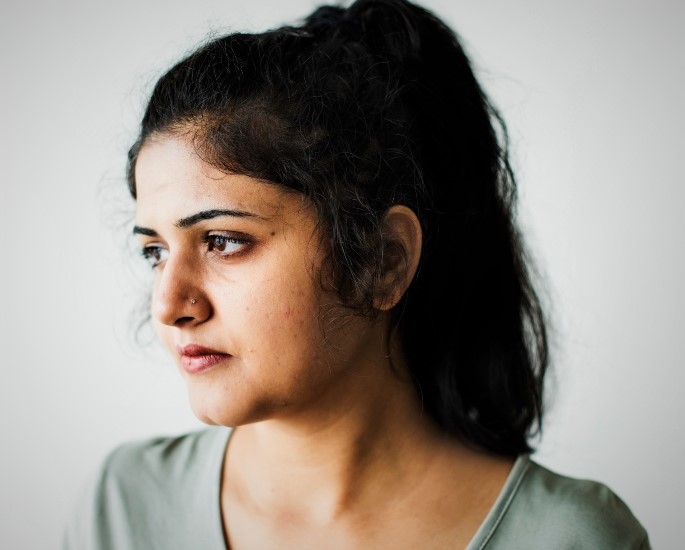
Parental separation and divorce can lead to emotionally turbulent times for all involved – including children.
Yet separation and divorce do not mean a family is broken, which is a dominant stereotype in society.
Elisha Singh*, a 25-year-old Indian teacher in Leeds takes significant issue with the idea of single-parent families as “broken families”:
“Within my work and elsewhere, I have heard many refer to single-parent homes as ‘broken families’.
“Often nothing cruel is meant, it’s more a reflection of dominant ideas of what the family is meant to be.
“But it’s still annoying and frustrating. We were a broken family when my parents were together! It was really bad.”
Elisha went on to assert:
“We became a real well-rounded family after my parents divorced. Their relationship got better as co-parents.”
For Elisha, a lasting impact from emotional trauma would have occurred if her parents didn’t divorce. For her, the divorce enabled a good family bond to flourish.
Contrastingly, Joshua Kapoor* a 31-year-old Indian car transporter in Birmingham had a different experience.
He revealed that for him and his three siblings, the breakdown and divorce were hard. For decades, he and his siblings were caught in the crosshairs of parental conflict:
“My parents had me wary of marriage for a long time. When things went bad, they went bad.”
“I and my brother and sister were used – to score points.
“Things were less toxic once they divorced completely, but still not smooth sailing.
“At least we could breathe when we just lived with one parent.
“It’s meant my brother goes from relationship to relationship. Where I and my sister are more cautious.”
It is clear how Desi children experience parental divorce and separation differently.
This type of break-up can be damaging for children and adults, but only sometimes. Elisha’s story underlines how it can be beneficial for the well-being and health of those involved.
The feelings and memories evoked by Elisha and Joshua show that children cannot be forgotten. It is also clear that these experiences can have long-term consequences, good or bad.
Childhood Experiences & Long-Term Effects
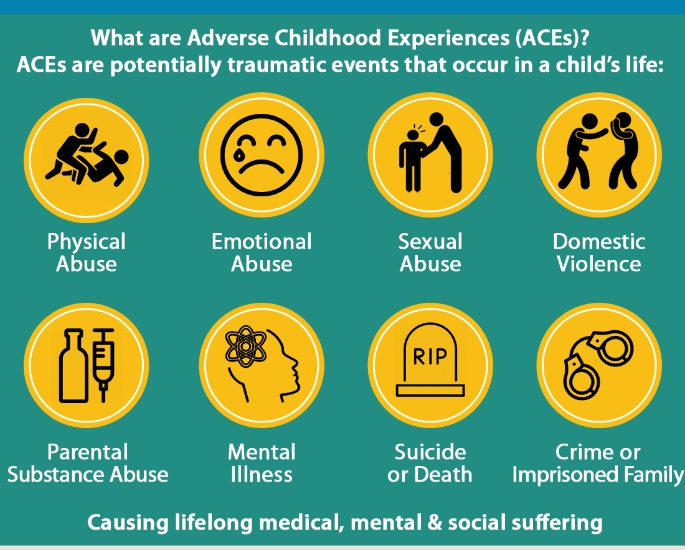
Experiences and incidents in childhood can impact many British Asians when growing up.
Adverse Childhood Experiences (ACEs) are potentially traumatic events that occur in childhood. ACEs include but are not limited to:
- Experiencing violence, abuse, or neglect.
- Witnessing violence in the home or community.
- Having a family member attempt or die by suicide.
- Aspects of the child’s environment that can undermine their sense of safety, stability, and bonding (e.g. parental separation/divorce).
ACEs are linked to criminality, chronic health problems, mental illness, and substance abuse in adulthood.
Moreover, ACEs can detrimentally impact elements like education and job opportunities.
It is important to remember how those raised in single-parent families perceive parental separation and the new family dynamics. Professor Mark Bellis told the BBC in 2017:
“A safe and nurturing childhood is a recipe for building stronger, happier children, with a much greater chance of becoming healthy adults.
“As costs of healthcare escalate in the UK and abroad, it is essential we take a life-course approach to health that recognises the problems we frequently see in adults begin with childhood traumas.”
Yet this does not mean parental separation/divorce is always situated as an adverse childhood experience.
South Asian families and communities need to abolish the long-standing ideology that divorce is always bad.
Instead of the separation being the focal point, the focus should shift to make sure the kids are protected and nurtured.
Ideologically in Desi communities, two-parent families are seen as essential for a good childhood. Although the reality is, this is not always the case.
Context cannot be forgotten. For some, becoming part of a single-parent family is invaluable and key for mental health and wellbeing.
Socio-Cultural Reactions to being Raised by Single Parents

Even as single-parent families are more common in 2021, those raised in such families can face cultural stigma and judgment.
Such stigma and judgment is a consequence of idealisations of marriage and attempts to control women’s status.
Ambreen Bibi*, a 30-year-old London based Pakistani teacher views her parents’ 2012 separation as a “blessing” for everyone. She finds the pitying reactions to her parents’ separation baffling and amusing:
“Seriously…the one that had me wince was ‘you never know they might get back together’.”
“It makes me smirk and shrug because I do not get what they have to be sorry for. It was a blessing on so many levels.”
The socio-cultural stigma attached to single-parent families disregards the fact that such families are not detrimental.
Mohammed Rahman*, a 28-year-old Bangladeshi youth worker lived with his father after his parent’s divorce in 2011:
“I know in society and culture there is this big alarm when it comes to the nuclear family breaking up. But it’s all a load of s**t.
“My sister and I never had a lack of love, resources or anything else being raised just by our dad. He went against the grain and didn’t fail.
“The surprise and questioning my dad faced did get to him at times, he worried and got annoyed. I hated people saying to him that we need a mother.”
For Mohammed, the view of mothers as inherently more maternal is problematic. For him, it is a sign of gender inequality that needs to be challenged.
The judgment Desi single-parent families (adults and children) can experience can lead to isolation, discomfort and hurt.
In 2011, Aruna Bansal set up the Asian Single Parents Network CIC, due to the substantial gap that existed in supporting single Desi parents and thus their children.
She states that the stigma attached to single-parent families remains in the South Asian community.
Aruna helped create a safe space for Desi single-parents and their children to socialise, support one another and gain peer support:
“We and the parents arrange events and trips that give them and their kid’s space to relax.
“The kids see that their family is normal and they get to interact with kids with similar experiences.”
The judgments attached to Desi single-parent families in the Asian community are in part due to how family and marriage remain idealised.
Cultural expectations and norms forget that single-parent families are as important and valuable as any other family form.
Accordingly, there is a need to reconfigure Desi and wider society’s perceptions of what the ideal family is.
Negative judgments of single-parent families need to be dismantled to ensure no Desi children and adults feel a sense of otherness.
Issues of Poverty within Single Parent Homes
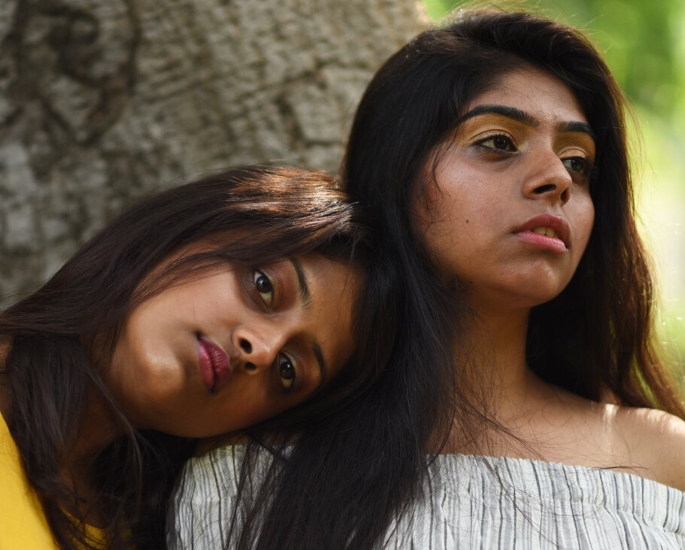
Research has shown that single-parent families disproportionately face shortages in many areas.
Inadequacies in resources, employment, and policy mean they face difficulties that dual-parent families do not.
The Joseph Rowntree Foundation after examining data between 1996-2020 maintain that children in single-parent families have high poverty rates. This remains the case even when their parent works full time.
Interestingly, the foundation highlights:
“In lone-parent families working full-time, poverty has risen from 13% in 1996/97 to 22% in 2018/19.
“Between 1998/99 and 2010/11, the child poverty rate in lone-parent families working part-time more than halved from 52% to 22%. It has since risen back to 41%.”
Data obtained by Save the Children, a charity that supports children across 122 countries, shows that over the 1 million single parents who receive Universal Credit, almost 9 in 10 are women.
In addition, the 2021 cut to the £20 uplift for Universal Credit and Working Tax Credit has hit single Desi parents and their children particularly hard.
Aruna Bansal asserts that Desi and other single-parent families do not get the financial support they should:
“Financially no they are not supported. Take the £20 uplift, they’ve lost money that was so vital to them.”
“£20 is your food bill for a week or part of it. So they’re having to make choices like ‘do I eat this week or do I spend money on the heating’.
“Single-parents need to be supported more by the government because they do not have that backup of a partner.”
The Child Poverty Action Group have found that the overall cost of bringing up a child has risen. For duel-parents, it has risen by 5.5% and 19% for single parents from 2012 to 2019.
These alarming numbers showcase the extreme adversity single parents can face, especially those in underrepresented communities.
Memories of those Raised by Single Parents
Asma Khan* a 20-year-old British Kashmiri in Birmingham is very conscious of the financial strains that her single mother can face:
“Ammi (mum) never lets us feel the money issue, but since last year I’ve become more aware. I don’t know how she does it.
“I now see how she has been super careful in what she buys and spends money on. When I was a kid, and even before last year, I had no clue.
“Ammi fought to make sure Aba (dad) paid proper child support, which I’m super glad about. But I’m only now realising how tight it’s been for her.
“One good thing is that seeing Ammi manage the money and how she’s done things over the years, helped me. I’m good with money and saving.
“Some of my friends, Asian and white, have no clue about money and are struggling, whereas I’m not.”
For Asma, being raised by a single mother has enabled her to gain an understanding of money management. A skill she feels is invaluable.
Research suggests single mothers are more likely to be in poverty and to be trapped in low wage jobs. They are also more likely to struggle to progress in their chosen line of work.
Structurally and politically, single-parent families need to be thought of more.
Imran Abid* is a 25-year-old Pakistani security guard in Birmingham. His father left their family in 2009 and he reveals:
“He never provided any help. Ammi (mum) didn’t push since she was scared he’d cause trouble. So yeah money was tight.
“I was a bit of a s**t when I was 15, moaning about not being able to do what my mates were. Or not being able to get the new game out.”
Reflecting on how his mum handled being a single parent, Imran spoke with pride:
“Looking back, she never let us see how hard it was for her. We always had food and heating.”
“But looking back, she went without things. She made sure we had what we needed before she got anything for herself.
“Things got better once she got the qualifications she needed for a good job. But it took time, she didn’t have anywhere to leave us, no one else to help.”
Imran’s mother came from a Desi generation where her family encouraged marriage over further education.
Thus she found herself leaving school with very few qualifications and marrying at 16 years old. This added further challenges to her experience being a single mother.
Nevertheless, as Imran stresses, his mother thrived as did he, even with the bumps that occurred and perhaps because of them.
Single-parent families can face financial strain in a way that families with two earners do not.
Accordingly, at a structural level, there is a need for review and restructuring of costs and provisions for childcare.
In addition, the neoliberal capitalist focus on individual responsibility and money needs to be considered. As such a focus does not facilitate a society and government that helps to create and maintain equality.
Confined by Cultural Expectations & Ideals?

Due to the experiences Desi parents have, they can encourage their children to question cultural ideals, in addition to focusing on skills and education to be independent.
Consider the words of Shareen Akhtar*, who is a 32-year-old Pakistani teacher in Birmingham:
“I was 12 when my parents split and mum really started to question stuff.
“Her perspective changed, she wanted us, girls, to focus on education and be confident. So that even if we do get married, we know we are capable of living independently.
“Mum still made sure we were raised knowing our heritage and culture. But she made sure we didn’t get brainwashed by the cultural bull she had.”
For Shareen, her parents’ separation was an important turning point.
Firstly, in her eyes, it gave her mother space to discover who she was and question problematic norms.
Secondly, it helped ensure she and her two sisters would not be trapped by traditional cultural ideas of what makes a good woman.
Moreover, Aruna Bansal, due to her personal and professional experiences, feels Desi parents encourage their children to focus on education to facilitate independence:
“Single parents have a hardworking work ethic that they instil in their kids.”
“I know a number of single parents whose kids are doing really well in university. One of my mums, her daughter is at Oxford.”
Aruna’s perspective is similar to that of Aliyah Haq*, a 30-year-old graduate based in Birmingham:
“Mum didn’t have the opportunity to explore the world and focus on her education when she was younger.
“My nana (maternal grandfather) was all focused on marriage. For him, women stayed home as much as possible.
“Then when my parents permanently separated, she was even more determined we would get to learn as much as we wanted.
“You should have seen her, she started to take the courses she wasn’t able to do in school. She was so focused, her coursework was wow.”
Aliyah shows great pride in her single mother’s achievements and resilience.
Highlighting the above is not to say education isn’t encouraged in two-parent families. Education is important across all Desi communities.
However, there is evidence like Shareen and Aliya’s stories, of a deep drive to focus on acquiring independent skills and self-reliance in single-parent families.
Interpersonal Bonds between Children & Single Parents
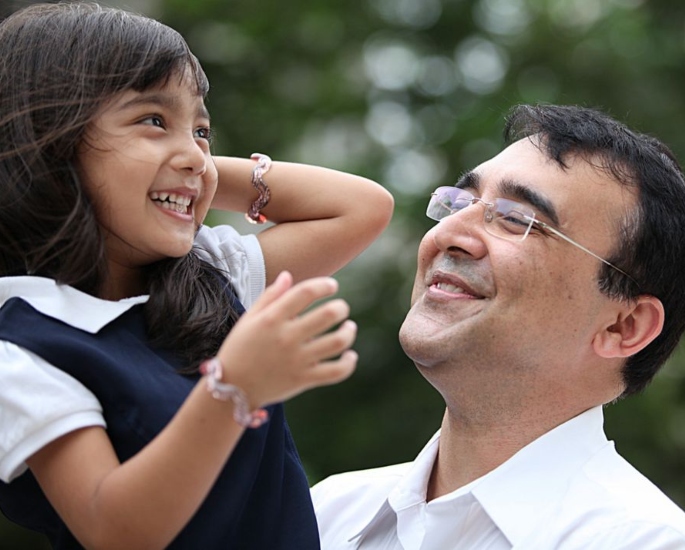
Those raised by single parents can have steel-like emotional and interpersonal bonds with their parents. Single-parent families do not equate to weak family and emotional bonds.
Aruna Bansal stresses:
“I think single parents have closer relationships with their kids due to the one-to-one interactions. They try to encourage their children to do better.”
Shareen Akhtar feels that if her mother had not become a single parent who had space to question, their relationship would be different:
“I will always love my mum, but when my parents were together she was pretty traditional in mentality. Like ‘you do this for your husband and the boys’.
“I really didn’t like it, I was way closer to my auntie. I went to my auntie when I needed advice or had issues when my parents were together.”
“She encouraged us girls but there were things that were really not good. After the spilt she reevaluated things and the gender inequality she was socialised into, unravelled.”
Shareen goes on to express:
“Don’t get me wrong, it wasn’t all sunshine and rainbows after the spilt. We had some massive arguments like any daughter does with her mum.
“But she’s the person I trust the most and look up to.
“Who she was before the split I loved, but the way in which she did certain things without questioning, hurt.”
Shareen strongly feels that being in a single-parent household was invaluable for her, her sisters and her mother.
This illustrates the strains on a single parent to develop these strong bonds, but also how they can be acquired within these families.
This is not emphasised enough in South Asian communities but should be highlighted in order to change the narrative for future generations.
British Asians raised by single parents talk about developing resilience, being able to ‘stand on their own two feet’.
In addition, single-parent families give them a degree of self-awareness that they may not have otherwise had. These are attributes Shareen and other Desis raised by single parents see as important.
Nevertheless, this does not mean there are no incidents of pain and trauma for children. However, this can occur within any family form and is not definite in single-parent families.
In the modern world, family ties are more richly varied than ever before.
Although, cultural ideologies continue to tar some family types that go against the ‘normal’ two-parent family form.
The voices of the British South Asians shared here show that their experiences need to be listened to.
Also, these stories highlight that single-parent families can cultivate rich and deep bonds between parents and children.
Not to mention they encourage a level of self-awareness, resilience, and independence that represent the true essence of South Asian culture.




















































